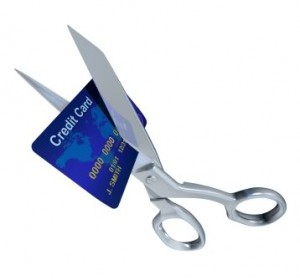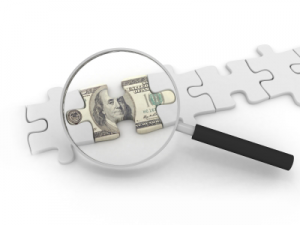December 30, 2011
 Statistics provided by the US Census Bureau show that the number of credit cards owned by American consumers is increasing. Many people have credit cards as an emergency backup resource when they need extra funds. However, with high credit card fees and interest rates, your credit card debt can get out of control. Instead of dealing with the stress of your increasing debt, consider canceling your credit cards for the following reasons:
Statistics provided by the US Census Bureau show that the number of credit cards owned by American consumers is increasing. Many people have credit cards as an emergency backup resource when they need extra funds. However, with high credit card fees and interest rates, your credit card debt can get out of control. Instead of dealing with the stress of your increasing debt, consider canceling your credit cards for the following reasons:
Eliminate your debt: Not owning a credit card means you don’t have unnecessary debt. If you max out one credit card and decide to pay off your debt with another credit card, you’re still left with credit card debt. This vicious cycle can escalate and leave you in a financial mess.
Maintain your budget: Staying within your budget is easier when you use cash for your purchases. Physically seeing the money you have makes you more reluctant to frivolously spend it. Handing over a credit card each time you make a purchase doesn’t make you realize how much you’re spending altogether. The shock sets in once you get your credit card statement. If you want to use a card to make your purchases and stay within your budget, use a prepaid card. Store-bought prepaid cards only allow you to spend the amount of money you put on them. When you run out of funds on your prepaid card you can replenish it as your budget allows.
Protect yourself: Each time you hand over your credit card to make a purchase you give others access to your credit card information. Whether you purchase items online or in a store, you subject yourself to identity theft. When you use cash there’s no need to disclose personal information. Identity theft can create a financial nightmare that leaves you with debt that can take years to clear up.
Avoid temptation: Credit card companies often offer tempting bonuses to attract consumers. Frequent flyer miles and points you can accrue when you use your card are not worth the hassle of paying back the money owed. Annual fees and interest rates quickly add up and add to your financial stress. Avoid using your card or acquiring one just to gain points or bonuses.
Save up: Instead of keeping an emergency credit card on hand, get rid of it. Instead, start saving up so you have at least $1000 available for emergencies.
Tags:
budgeting,
credit,
Credit Card,
credit card consolidation,
Credit Card Debt,
credit card debt consolidation,
credit card debt settlement,
credit settlement,
financial planning,
money / finance,
personal finance,
planning
December 22, 2011
 For a retired individual, earning something extra without spending anything extra is a great chance. With the tiny amount of pension, which they receive, it becomes difficult for them to meet their essential needs and requirements. As a result of this, they have to opt for some other alternative. Equity release is what comes into consideration in this respect. It is the financial scheme that has specifically been designed for the old retirees, who are left with nothing other than their pensions at the advanced stage of their life.
For a retired individual, earning something extra without spending anything extra is a great chance. With the tiny amount of pension, which they receive, it becomes difficult for them to meet their essential needs and requirements. As a result of this, they have to opt for some other alternative. Equity release is what comes into consideration in this respect. It is the financial scheme that has specifically been designed for the old retirees, who are left with nothing other than their pensions at the advanced stage of their life.
The equity release plan is very useful for the retirees. This is because it does not ask the retirees to make any kind of extra deposit. However, to qualify for these finance options, the individuals must be of at least 55 years of age and should have a possession, in this case it is the ownership of a house. The credential that you submit with your application proves your age. As soon as you apply for the loans, the lenders pay a visit to your property to find out the condition in which it is. If the lenders are satisfied with the property maintenance and all other factors, they will surely allow you to avail the equity release finance.
By giving the opportunity to the old individuals to earn in lieu of their own property, the equity release lenders allow them to get some return on the investment they have made long ago. Thus, when one starts planning for his or her retirement, it is very important for him or her to remain serious about the maintenance activities of the house, like home improvement work, etc. Only through this, better income after retirement can be guaranteed to the old individuals.
s far as the repayment is concerned, equity release debt can be paid back when the borrowers are alive and can be even paid back after they expire. This can be done by selling the house in lie of which they received the earning. With the help of this repayment term, the lenders get back their lent mount inclusive of the interest and even more sometimes.
Tags:
budgeting,
financial planning,
Financial Retirement,
Future investments,
Future plans,
personal finance,
Retirement,
Retirement Planning,
Save Money
December 21, 2011
 A question that has been considered for decades is whether it is better to invest in property or stocks. Both markets are increasing in value and have been for many years so where is the wisest place to invest your money? This article will consider the pros and cons of investment property vs. stocks.
A question that has been considered for decades is whether it is better to invest in property or stocks. Both markets are increasing in value and have been for many years so where is the wisest place to invest your money? This article will consider the pros and cons of investment property vs. stocks.
The Pros of Real Estate
- Real estate investment is accessible to everyone. Everyone needs a home in which to live and everyone is able to gain access to a loan if they approach it sensibly. Whilst most people are not exposed to stocks and bonds as a child everyone is exposed to a plethora of different properties and buildings. This enables people to build a knowledge base over the years and gain an automatic insight into investing in property.
- It is a tangible investment. Property is something you can physically see and touch whereas stocks and bonds are not.
- It is difficult to defraud someone who is buying real estate. The buyer can turn up and see the property and can run property valuation software from home so they know the true value of the property when they buy it.
- Using debt, you can make a much larger investment than you have the means for. This enables a larger initial investment than could be managed in other forms of investment.
The Cons of Real Estate
- When compared to stocks real estate can take a lot of time to manage. If a water main bursts at midnight then it will be you who gets a phone call and you will have to deal with it straight away.
- If the property is unoccupied for any reason then it will effectively be costing you money each month. Mortgage repayments will be due regardless of whether you were able to find a tenant.
The Pros of the Stock Market
- The greatest wealth creator in the history of finance is that of stock trade. Despite occasional crashes which could see large losses, the investment and reinvestment in stocks is the single greatest creator of wealth in the world.
- Ownership of stocks and shares does not require any input from you. Once you own the stocks you are able to sit back and watch the company improve and grow along with your investment.
- You will receive cash dividends every year. Unlike the housing market which could cost you each month, dividends will provide you with cash every year.
- Stocks enable diversity of investment. Unlike a house which requires huge input all at once, stocks can be bought in small amounts when you are able to and they will still have the same effect.
- Stocks can be sold easily and rapidly. If you need cash or want to get out of your share position then it is easy to sell your stocks rapidly. Those who make the most money from stocks often buy and resell stocks within a single day.
Cons of the Stock Market
- Despite their steady growth over the years, stocks are able to crash without warning. Global financial changes can cause stocks and shares to drop in value dramatically within just a few minutes. This means that your solid investment could crash at any time leaving you without your funds.
- The price of stocks can fluctuate massively in short periods of time even when there is no financial crash. The nature of stocks means that within a day there can be huge fluctuations in the value of stocks, making it a very uncertain place in which to invest.
Tags:
budgeting,
finance,
personal finance,
Property,
real estate,
stock,
Stock Market,
stock trading
December 16, 2011
 If you have a new car, you’re amongst the lucky as purchasing a new car isn’t an easy thing to do. New cars come with a big price tag and you need to have a big budget if you want to make the dream of owning a car come true. However, overtime, as other things have become easier to do, purchasing a car is not that big of a problem for anyone who wants to get it, all thanks to several online lending groups. There are several types of auto loans that you can choose from to get a car loan but the decision is yours to make; either you can get a new car loan or acquire loan for used cars; it depends on how much you can pay.
If you have a new car, you’re amongst the lucky as purchasing a new car isn’t an easy thing to do. New cars come with a big price tag and you need to have a big budget if you want to make the dream of owning a car come true. However, overtime, as other things have become easier to do, purchasing a car is not that big of a problem for anyone who wants to get it, all thanks to several online lending groups. There are several types of auto loans that you can choose from to get a car loan but the decision is yours to make; either you can get a new car loan or acquire loan for used cars; it depends on how much you can pay.
Choosing an auto loan is the tricky part. Many people think that since they will have to pay the loan back in monthly payments, it shouldn’t be an issue to get an expensive car, which otherwise would have been out of their reach. It is better if you stay realistic and be practical and choose an auto loan according to your purchasing power capability. For instance, if you can’t afford paying monthly installments for a new car, DON’T go for it, rather choose something that you can easily afford to pay.
Submitting an application for a used car loan is relatively simpler if you’re doing it online. Several lenders are present online that provide the quote of their loans free of charge. You should start by gathering information on quotes from several online lending groups available out there and once you have collected the rates, it is advisable that you then compare and contrast to select the one that is best for you.
In order to calculate the amount of money that you will be required to pay out every month and to assure if you can really get a new car, use an auto loan calculator which will help in clearing out the picture in your mind as to how much money will be escaping your pocket every month to finance your car loan.
There is however, a common problem amongst buyers which arises because of online lenders charging hate rates of APR or interest rates. If you come across this problem, you should resort to a refinance auto loan. What the refinance auto loan does is that it assists you in saving money when you are paying back money of the acquired car loan. Refinancing will help in reducing your monthly payments. Moreover, there is also an option of you paying out the entire remaining balance of your loan if you want to after paying some installments initially. Tip for choosing a refinance loaner is that you need to search for a good rated company which also has a good repute. They will require you to put your signature on some papers and go through the terms of paying the balance off. If things go smooth, the company you have taken the refinance from will pay out the remaining balance of yours left with your previous lender and provide you a new loan at better terms and rates.
It is advisable for you to go through different sources before you select an auto refinance loan providing company. To get the car loan, you will have to make the choice yourself. Do the math and choose the best option for yourself.
Tags:
finance,
loans,
money,
mortgage,
Mortgage loan refinance,
Mortgage loans,
Mortgage Refinance,
personal finance,
Refinance loan,
Refinance mortgage
December 15, 2011
 Knowing how your mortgage works can help you keep it from working against you. Many people think that their mortgage payment is only used to pay off the amount of the loan. That assumption can hurt those people, as the mortgage payment is based on the length of the mortgage loan taken out.
Knowing how your mortgage works can help you keep it from working against you. Many people think that their mortgage payment is only used to pay off the amount of the loan. That assumption can hurt those people, as the mortgage payment is based on the length of the mortgage loan taken out.
1. How a Mortgage Works
If a mortgage is to be paid over 30 years, the payments extend the amount owed, due to the interest charges added to the total. This interest is also compounded, meaning eventually you will also pay interest on this interest. Quite simply, a large chunk of you payments could be devoted to simply paying interest.
2. Getting the Best Deal
Once the interest has been paid, the loan amount will be lessened each year and the 30-year mortgage will be paid in full with interest at the end of the 30 year period. Understanding that your mortgage payment is actually an interest payment might help you to try and learn how to save money. For instance, make sure that you can pay more than the monthly payment and that you can even pay in full. This may sound like irrelevant, but an unforeseen inheritance or great night at the casino could make this a distinct possibility. Also, make sure you shop around for the best deal. If your credit score is low enough, you may be able to get a great interest rate!
3. Paying it Off
You can save money on your mortgage by making the mortgage payments on time, avoiding late fees. If you can pay more than is due, this will also help. An extra $100 a month means an extra $1200 a year and this could save you years of payments. Try to anticipate your future income and you could make sure your payment plan fits well.
4. Tips and Secrets
Your mortgage is attached to the property that you have borrowed money to buy. However, you are still in control of that property if you continue to make your payments on time. For instance, if your house is a little bigger or nicer than necessary, you can sell your property for more than you have borrowed to buy it and use the proceeds to pay off your mortgage and make a profit. Or, if you have a great interest rate on a savings account, you could put the money you’d normally use to make higher payments in this account and profit – then use the profit to pay a big chunk of your mortgage in a lump sum.
It’s easy to save money on your mortgage, but you need to understand it fully. Speak with your lender to find out where every dollar you pay goes and ask every question that comes to mind. Also be sure to ask for any ways you could say money, because you’d be surprised at the secret options out there!
Tags:
finance,
money,
Mortage Refinance,
mortgage,
Mortgages,
real estate
 Statistics provided by the US Census Bureau show that the number of credit cards owned by American consumers is increasing. Many people have credit cards as an emergency backup resource when they need extra funds. However, with high credit card fees and interest rates, your credit card debt can get out of control. Instead of dealing with the stress of your increasing debt, consider canceling your credit cards for the following reasons:
Statistics provided by the US Census Bureau show that the number of credit cards owned by American consumers is increasing. Many people have credit cards as an emergency backup resource when they need extra funds. However, with high credit card fees and interest rates, your credit card debt can get out of control. Instead of dealing with the stress of your increasing debt, consider canceling your credit cards for the following reasons:




Recent Comments